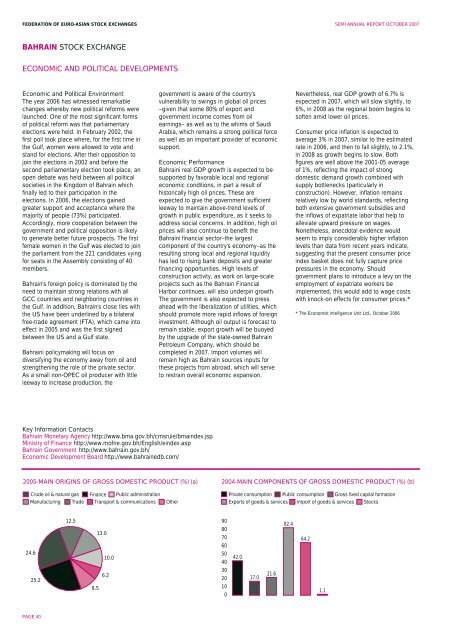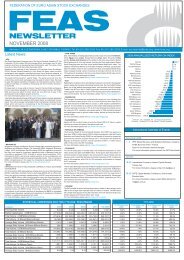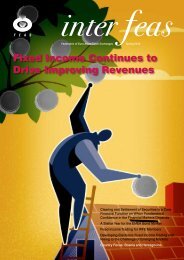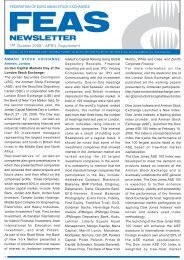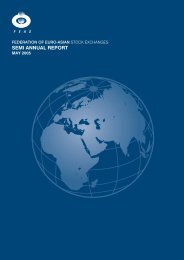Download - FEAS
Download - FEAS
Download - FEAS
- No tags were found...
Create successful ePaper yourself
Turn your PDF publications into a flip-book with our unique Google optimized e-Paper software.
FEDERATION OF EURO-ASIAN STOCK EXCHANGES SEMI ANNUAL REPORT OCTOBER 2007BAHRAIN STOCK EXCHANGEECONOMIC AND POLITICAL DEVELOPMENTSEconomic and Political EnvironmentThe year 2006 has witnessed remarkablechanges whereby new political reforms werelaunched. One of the most significant formsof political reform was that parliamentaryelections were held. In February 2002, thefirst poll took place where, for the first time inthe Gulf, women were allowed to vote andstand for elections. After their opposition tojoin the elections in 2002 and before thesecond parliamentary election took place, anopen debate was held between all politicalsocieties in the Kingdom of Bahrain whichfinally led to their participation in theelections. In 2006, the elections gainedgreater support and acceptance where themajority of people (73%) participated.Accordingly, more cooperation between thegovernment and political opposition is likelyto generate better future prospects. The firstfemale women in the Gulf was elected to jointhe parliament from the 221 candidates vyingfor seats in the Assembly consisting of 40members.Bahrain's foreign policy is dominated by theneed to maintain strong relations with allGCC countries and neighboring countries inthe Gulf. In addition, Bahrain's close ties withthe US have been underlined by a bilateralfree-trade agreement (FTA), which came intoeffect in 2005 and was the first signedbetween the US and a Gulf state.Bahraini policymaking will focus ondiversifying the economy away from oil andstrengthening the role of the private sector.As a small non-OPEC oil producer with littleleeway to increase production, thegovernment is aware of the country'svulnerability to swings in global oil prices–given that some 80% of export andgovernment income comes from oilearnings– as well as to the whims of SaudiArabia, which remains a strong political forceas well as an important provider of economicsupport.Economic PerformanceBahraini real GDP growth is expected to besupported by favorable local and regionaleconomic conditions, in part a result ofhistorically high oil prices. These areexpected to give the government sufficientleeway to maintain above-trend levels ofgrowth in public expenditure, as it seeks toaddress social concerns. In addition, high oilprices will also continue to benefit theBahraini financial sector–the largestcomponent of the country's economy–as theresulting strong local and regional liquidityhas led to rising bank deposits and greaterfinancing opportunities. High levels ofconstruction activity, as work on large-scaleprojects such as the Bahrain FinancialHarbor continues, will also underpin growth.The government is also expected to pressahead with the liberalization of utilities, whichshould promote more rapid inflows of foreigninvestment. Although oil output is forecast toremain stable, export growth will be buoyedby the upgrade of the state-owned BahrainPetroleum Company, which should becompleted in 2007. Import volumes willremain high as Bahrain sources inputs forthese projects from abroad, which will serveto restrain overall economic expansion.Nevertheless, real GDP growth of 6.7% isexpected in 2007, which will slow slightly, to6%, in 2008 as the regional boom begins tosoften amid lower oil prices.Consumer price inflation is expected toaverage 3% in 2007, similar to the estimatedrate in 2006, and then to fall slightly, to 2.1%,in 2008 as growth begins to slow. Bothfigures are well above the 2001-05 averageof 1%, reflecting the impact of strongdomestic demand growth combined withsupply bottlenecks (particularly inconstruction). However, inflation remainsrelatively low by world standards, reflectingboth extensive government subsidies andthe inflows of expatriate labor that help toalleviate upward pressure on wages.Nonetheless, anecdotal evidence wouldseem to imply considerably higher inflationlevels than data from recent years indicate,suggesting that the present consumer priceindex basket does not fully capture pricepressures in the economy. Shouldgovernment plans to introduce a levy on theemployment of expatriate workers beimplemented, this would add to wage costswith knock-on effects for consumer prices.** The Economist Intelligence Unit Ltd., October 2006Key Information ContactsBahrain Monetary Agency http://www.bma.gov.bh/cmsrule/bmaindex.jspMinistry of Finance http://www.mofne.gov.bh/English/eindex.aspBahrain Government http://www.bahrain.gov.bh/Economic Development Board http://www.bahrainedb.com/2005-MAIN ORIGINS OF GROSS DOMESTIC PRODUCT (%) (a)2004-MAIN COMPONENTS OF GROSS DOMESTIC PRODUCT (%) (b)Crude oil & natural gasFinance Public administrationTransport & communicationsPrivate consumption Public consumption Gross fixed capital formationManufacturingTradeOtherExports of goods & services Import of goods & services Stocks12.513.09080706082.464.224.610.0504042.025.26.28.5302010017.021.61.1PAGE 40


